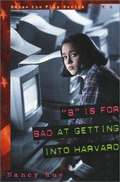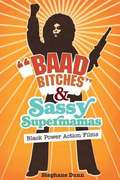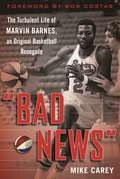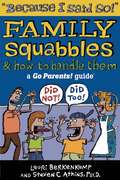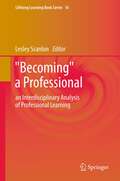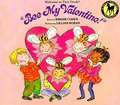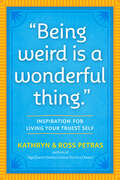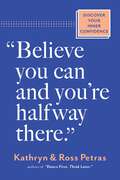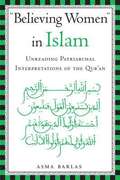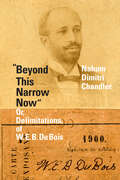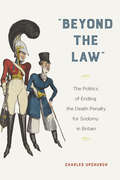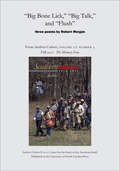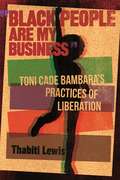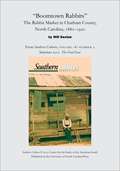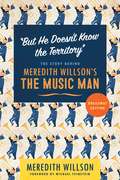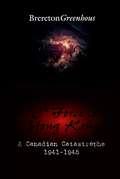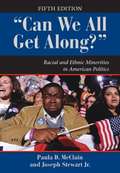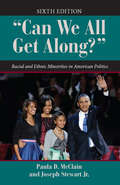- Table View
- List View
"B" Is for Bad at Getting into Harvard (Raise the Flag #2)
by Nancy RueA diverse group of high school girls faces the challenges of standing up for what they believe is right. You'll cheer them on and learn more about yourself in each book of the Raise the Flag series! One of the two editors-in-chief of the King High newspaper, Norie runs with the "high achiever" crowd: kids who participate in things like the Academic Olympics...and cheating rings. As a Christian who has recently rededicated her life to God, Norie doesn't want to be a part of it. But stress builds as her friends pressure her to help them. Even worse, Norie's dad wants her to study more instead of spending time with her prayer partners, the Flagpole Girls. He desperately wants her to get into Harvard. But with the change in the grade curve, that'll never happen unless Norie starts cheating, too. Now if she's going to resist the temptation--and avoid being framed by the very kids she's trying to stop--she's going to need prayer, and her Christian friends, more than ever before.
"Baad Bitches" and Sassy Supermamas: Black Power Action Films
by Stephane DunnThis lively study unpacks the intersecting racial, sexual, and gender politics underlying the representations of racialized bodies, masculinities, and femininities in early 1970s black action films, with particular focus on the representation of black femininity. Stephane Dunn explores the typical, sexualized, subordinate positioning of women in low-budget blaxploitation action narratives as well as more seriously radical films like Sweet Sweetback's Baadasssss Song and The Spook Who Sat by the Door, in which black women are typically portrayed as trifling "bitches" compared to the supermacho black male heroes. The terms "baad bitches" and "sassy supermamas" signal the reversal of this positioning with the emergence of supermama heroines in the few black action films in the early 1970s that featured self-assured, empowered, and tough (or "baad") black women as protagonists: Cleopatra Jones, Coffy, and Foxy Brown. Dunn offers close examination of a distinct moment in the history of African American representation in popular cinema, tracing its emergence out of a radical political era, influenced especially by the Black Power movement and feminism. "Baad Bitches" and Sassy Supermamas also engages blaxploitation's impact and lingering aura in contemporary hip-hop culture as suggested by its disturbing gender politics and the "baad bitch daughters" of Foxy Brown and Cleopatra Jones, rappers Lil' Kim and Foxy Brown.
"Bad News": The Turbulent Life of Marvin Barnes, Pro Basketball's Original Renegade
by Mike Carey Bob CostasMarvin "Bad News" Barnes was considered a future Hall of Fame basketball player before he even graduated from college. A standout at Providence College, where he averaged 20.7 points and 17.9 rebounds per game, he was an All-American with the world at his fingertips.Although Barnes enjoyed two highly successful years in the American Basketball Association with the Spirits of St. Louis (winning Rookie of the Year honors and twice being named an All-Star), his career fizzled in the NBA as he wore out his welcome with the Detroit Pistons, Buffalo Braves, Boston Celtics, and San Diego Clippers in four years. His immaturity, as well as a chronic losing battle with drugs and alcohol, turned a potential superstar into a has-been by 1979. By then, his swagger was gone. So too was his game.Written by Mike Carey, who opened his house to Barnes later in his life, this is the story of a supremely gifted athlete whose self-destructive nature led to him living on the mean streets of East San Diego for three years as a panhandler and pimp. Eventually he would serve a total of five years in prison for various felony charges, including the sale of cocaine.Throughout his life, every time it appeared that "Bad News" had turned the corner, his demons reappeared and succeeded in luring him back into becoming a conniving dope fiend.On September 8, 2014, Barnes finally hit rock bottom, passing away due to acute cocaine and heroin intoxication. He was sixty-two years old.With stories and quotes from Julius Erving, Bill Walton, Larry Brown, Mike D'Antoni, and many others who crossed paths with Barnes, as well as a foreword from former Spirits announcer Bob Costas, "Bad News" is the story of a squandered talent who could never defeat his inner demons.
"Be the Change You Wish to See in the World": Choosing to Be a Resonant Leader
by Annie Mckee Richard BoyatzisBecoming a great and resonant leader does not happen by accident. This chapter asks leaders to tackle the challenges of personal transformation and renewal to achieve resonance.
"Because I Said So!": Family Squabbles and How to Handle Them (a Go Parents! Guide®)
by Lauri Berkenkamp Steven C. AtkinsFor parents everywhere whose kids complain about helping around the house, stall over homework, and bicker with one other, help is at hand. With compassion and humor, this book takes on the most common points of kid-induced friction--those altercations and annoying behaviors that drive parents most nuts--and offers quick, practical how-to advice for how to handle them. It explains to parents how to navigate everyday challenges, from helping kids learn responsibility for their possessions to getting them to stop tattling, whining, and using disrespectful language. Complete with solutions, helpful hints, and interesting bits of information, this indispensable guide offers exasperated parents the emotional support and reassurance they need to reduce friction and increase communication in the household.
"Becoming" a Professional: an Interdisciplinary Analysis of Professional Learning (Lifelong Learning Book Series #16)
by Lesley ScanlonThis book is founded on the idea that 'becoming' is the most useful defining concept for a new 'professional' class whose members understand that development in their working lives is an open-ended, lifelong process of refinement and learning. In a world where being a 'professional' is an increasingly indistinct notion and where better education and technology are challenging 'professional' norms, it is imperative that we no longer think in terms of an exclusive, 'Anglo-American', knowledge-rich class of workers. Exploring the implications of this insight for professions including nursing, teaching, social work, engineering and the clergy, this volume aims to encourage informed debate on what it means to be a 'professional' in this globalised 21st century. The book argues that 'becoming' a professional is a lifelong process in which individual professional identities are constructed through formal education, workplace interactions and popular culture. The book advocates the 'ongoingness' of developing a professional self throughout one's professional life. What emerges is a concept of becoming a professional different from the isolated, rugged, individualistic approach to traditional professional practice as represented in popular culture. It is a book for the reflective professional.
"Bee My Valentine!"
by Miriam Cohen[from the back cover] "It's Valentine's Day in First Grade. All the children send cards to each other. Everyone is excited. Some people get lots of cards--but some people don't. And there are tears. But Jim knows how to make George feel better--and all the others join in. By the time the refreshments arrive, it is indeed a Happy Valentine's Day for everyone in First Grade."
"Being Weird Is a Wonderful Thing": Inspiration for Living Your Truest Self
by Ross Petras Kathryn PetrasA gift that celebrates being yourself, in your own unique way. Do you ever feel different? A little weird, a little wacky? It&’s time to own it, because, as Meryl Streep proclaimed, &“what makes you different or weird, that&’s your strength.&” In this inspiring collection, singers, poets, actors, activists, comedians, designers, athletes, and philosophers share wise and pithy reflections on what it&’s like to march to the beat of a different drummer. Every statement is a powerful, positive reminder that to live successfully is to be completely unapologetically you. &“We are not what other people say we are. We are who we know ourselves to be, and we are what we love. That&’s OK.&” —Laverne Cox &“All the colors I am inside have not been invented yet.&” —Shel Silverstein &“I am different, not less&” —Temple Grandin &“The more I feel imperfect, the more I feel alive.&” —Jhumpa Lahiri &“Self-censorship is insulting to the self. Timidity is a hopeless way forward.&” —Ai Weiwei
"Believe You Can and You're Halfway There": Discover Your Inner Confidence
by Ross Petras Kathryn PetrasA compilation of musings to motivate and inspire readers in need of a quick pick-me-up. We all want to be the person who marches into a meeting brimming with self-confidence, unbothered by what others think of them right before making a killer speech. But all too often, crippling self-doubt creeps in. This book is a self-esteem boosting collection of pocket-sized pep talks from successful people in a multitude of fields, including Serena Williams, Stephen King, Helen Keller, Julia Child, and so much more—that will give readers a strong dose of self-assurance. &“I am lucky that whatever fear I have inside me, my desire to win is always stronger.&” —Serena Williams &“The scariest moment is always just before you start.&” —Stephen King &“Optimism is the faith that leads to achievement. Nothing can be done without hope and confidence.&” —Helen Keller &“Just speak very loudly and quickly, and state your position with utter conviction, as the French do, and you&’ll have a marvelous time!&” —Julia Child
"Believing Women" in Islam
by Asma BarlasDoes Islam call for the oppression of women? Non-Muslims point to the subjugation of women that occurs in many Muslim countries, especially those that claim to be "Islamic," while many Muslims read the Qur'an in ways that seem to justify sexual oppression, inequality, and patriarchy. Taking a wholly different view, Asma Barlas develops a believer's reading of the Qur'an that demonstrates the radically egalitarian and anti-patriarchal nature of its teachings. Beginning with a historical analysis of religious authority and knowledge, Barlas shows how Muslims came to read inequality and patriarchy into the Qur'an to justify existing religious and social structures and demonstrates that the patriarchal meanings ascribed to the Qur'an are a function of who has read it, how, and in what contexts. She goes on to reread the Qur'an's position on a variety of issues in order to argue that its teachings do not support patriarchy. To the contrary, Barlas convincingly asserts that the Qur'an affirms the complete equality of the sexes, thereby offering an opportunity to theorise radical sexual equality from within the framework of its teachings.
"Beneficial" Delays in Debt Restructuring Negotiations
by Ran BiA report from the International Monetary Fund.
"Beyond This Narrow Now": Or, Delimitations, of W. E. B. Du Bois
by Nahum Dimitri ChandlerIn “Beyond This Narrow Now” Nahum Dimitri Chandler shows that the premises of W. E. B. Du Bois's thinking at the turn of the twentieth century stand as fundamental references for the whole itinerary of his thought. Opening with a distinct approach to the legacy of Du Bois, Chandler proceeds through a series of close readings of Du Bois's early essays, previously unpublished or seldom studied, with discrete annotations of The Souls of Black Folk: Essays and Sketches of 1903, elucidating and elaborating basic epistemological terms of his thought. With theoretical attention to how the African American stands as an example of possibility for Du Bois and renders problematic traditional ontological thought, Chandler also proposes that Du Bois's most well-known phrase—“the problem of the color line”—sustains more conceptual depth than has yet been understood, with pertinence for our accounts of modern systems of enslavement and imperial colonialism and the incipient moments of modern capitalization. Chandler's work exemplifies a more profound engagement with Du Bois, demonstrating that he must be re-read, appreciated, and studied anew as a philosophical writer and thinker contemporary to our time.
"Beyond the Law": The Politics of Ending the Death Penalty for Sodomy in Britain (Sexuality Studies)
by Charles UpchurchIn nineteenth-century England, sodomy was punishable by death; even an accusation could damage a man’s reputation for life. The last executions for this private, consensual act were in 1835, but the effort to change the law that allowed for those executions was intense and precarious, and not successful until 1861. In this groundbreaking book, “Beyond the Law,” noted historian Charles Upchurch pieces together fragments from history and uses a queer history methodology to recount the untold story of the political process through which the law allowing for the death penalty for sodomy was almost ended in 1841. Upchurch recounts the legal and political efforts of reformers like Jeremy Bentham and Lord John Russell—the latter of whom argued that the death penalty for sodomy was “beyond the law and above the law.” He also reveals that a same-sex relationship linked the families of the two men responsible for co-sponsoring the key legislation. By recovering the various ethical, religious, and humanitarian arguments against punishing sodomy, “Beyond the Law” overturns longstanding assumptions of nineteenth-century British history. Upchurch demonstrates that social change came from an amalgam of reformist momentum, family affection, elitist politics, class privilege, enlightenment philosophy, and personal desires.
"Big Bang" Versus Gradualism in Economic Reforms: An Intertemporal Analysis with an Application to China
by Saleh M. Nsouli Andrew FeltensteinA report from the International Monetary Fund.
"Big Bone Lick," "Big Talk," and "Flush": three poems (Southern Cultures #Volume 17 Number 3)
by Robert MorganMason-Dixon Lines "Big Bone Lick," "Big Talk," and "Flush" poetry by Robert MorganRobert Morgan drives home a similar message with three poems. They address "memory" on the grandest scale-- not merely familial or communal but epochal and even geologic." . . . for ten millennia, the bonesseemed wreckage from a mighty dream . . . "
"Black People Are My Business": Toni Cade Bambara's Practices of Liberation (African American Life Series)
by Thabiti Lewis"Black People Are My Business": Toni Cade Bambara’s Practices of Liberation studies the works of Bambara (1939–1995), an author, documentary filmmaker, social activist, and professor. Thabiti Lewis’s analysis serves as a cultural biography, examining the liberation impulses in Bambara’s writing, which is concerned with practices that advance the material value of the African American experience and exploring the introspection between artist production and social justice. This is the first monograph that focuses on Bambara’s unique approach and important literary contribution to 1970s and 1980s African American literature. It explores her unique nationalist, feminist, Marxist, and spiritualist ethos, which cleared space for many innovations found in black women’s fiction. Divided into five chapters, Lewis’s study relies on Bambara’s voice (from interviews and essays) to craft a "spiritual wholeness aesthetic"—a set of principles that comes out of her practices of liberation and entail family, faith, feeling, and freedom—that reveals her ability to interweave ethnic identity, politics, and community engagement and responsibility with the impetus of balancing black male and female identity influences and interactions within and outside the community. One key feature of Bambara’s work is the concentration on women as cultural workers whereby her notion of spiritual wholeness upends what has become a scholarly distinction between feminism and black nationalism. Bambara’s fiction situates her as a pivotal voice within the Black Arts Movement and contemporary African American literature. Bambara is an understudied and important artistic voice whose aversion to playing it safe both personified and challenged the boundaries of black nationalism and feminism. "Black People Are My Business" is a wonderful addition to any reader’s list, especially those interested in African American literary and cultural studies.
"Boomtown Rabbits": The Rabbit Market in Chatham County, North Carolina, 1880-1920 (Southern Cultures #Volume 18 Number 2)
by Will SextonAlthough the same cottontails flourished across the region, Chatham County turned its rabbits into something like a regional brand, recognized throughout the South and along the eastern seaboard. By the end of the nineteenth century, Siler City had become the de facto rabbit capital of the southeast." This article appears in the Summer 2012 issue of Southern Cultures. The full issue is also available as an ebook. Southern Cultures is published quarterly (spring, summer, fall, winter) by the University of North Carolina Press. The journal is sponsored by the University of North Carolina at Chapel Hill's Center for the Study of the American South.
"But He Doesn't Know the Territory": The Story behind Meredith Willson's The Music Man
by Meredith WillsonChronicles the creation of Meredith Willson&’s The Music Man—reprinted now as the Broadway Edition Composer Meredith Willson described The Music Man as &“an Iowan&’s attempt to pay tribute to his home state.&” Now featuring a new foreword by noted singer and educator Michael Feinstein, this book presents Willson&’s reflections on the ups and downs, surprises and disappointments, and finally successes of making one of America&’s most popular musicals. Willson&’s whimsical, personable writing style brings readers back in time with him to the 1950s to experience firsthand the exciting trials and tribulations of creating a Broadway masterpiece. Fresh admiration of the musical—and the man behind the music—is sure to result.
"C" Force to Hong Kong: A Canadian Catastrophe
by Brereton GreenhousThis is the story of a “no military risk” campaign that slowly turned into a nightmare. The book provides new answers to a number of difficult questions beginning with a discussion of why Canadian troops were sent to Hong Kong at the request of the British War Office. Were the British duplicitous in making this request? Was Canadian Chief of the General Staff, Lieutenant-General Harry Crerar, guilty of putting his own interests above those of his men in telling the minister of National Defence that there was “no military risk” in sending the “C” Force? The book recounts the formation of the “C” Force and its departure to Hong Kong where it arrived just three weeks before the Japanese attack. It outlines the course of the battle from December 8, 1941, until the inevitable surrender of the garrison on Christmas Day. It places appropriate emphasis on the Canadian contribution, refuting 1947 allegations by the British General-Officer-Commanding — allegations which were only made public in 1993 — that the Canadians did not fight well. Greenhous attacks these charges with solid evidence from participants and eye-witnesses. Finally, the book tells the story of life and death in the prison camps of Hong Kong and Japan.
"C" Is for Cupcake
by Carolyn HaywoodThe first grade taught by Mrs. Wilkins in this book is an exciting place. Mrs. Wilkins is a teacher who is game for any activity that her pupils suggest, and Carolyn Haywood is just the writer to make sure that she never remains unchallenged for long. Most of the escapades concern Christie's pet rabbit named Cupcake, but further complications abound. Christie first takes Cupcake to school when the rest of the class is bringing baked goods to sell on Cupcake Day. Despite the confusion, the white rabbit quickly becomes the unofficial mascot of the room. Other animals also enter Mrs. Wilkins's life. At various times she must cope with a Siamese cat on the rampage and a Belgian rabbit named Cinnamon Bun. The climax comes, however, when baby rabbits arrive during breakfast at which the first graders are entertaining their daddies. First grade today is made for the irrepressible children created by Carolyn Haywood. Warm and funny, her story of their year's doings captures the spirit of the modern school.
"Can We All Get Along?"
by Paula D. Mcclain Joseph Stewart Jr.In a nation built by immigrants and bedeviled by the history and legacy of slavery and discrimination, issues of liberty, equality, and community continue to challenge Americans. In the fifth edition of this widely acclaimed text, Paula McClain and Joseph Stewart combine traditional elements of political science analysis--history, Constitutional theory, institutions, political behavior, and policy actors--with a fully updated survey of the political status of four major groups: blacks, Latinos, Asian Americans, and American Indians. McClain and Stewart show similarities and differences in these groups' political action and experience, and point the way toward coalition, competition, and consensus building in the face of ongoing conflict. Two dilemmas shape the book: How do we as a nation reconcile a commitment to equality with persistent inequality and discrimination? And what can we do about it--from the perspective of ethnic and racial minorities as well as within the dominant culture? Thoroughly updated following the historic 2008 presidential election, this new edition provides a concise overview of minority politics in America.
"Can We All Get Along?"
by Paula D. Mcclain Joseph Stewart Jr.In a nation built by immigrants and bedeviled by the history and legacy of slavery and discrimination, issues of liberty, equality, and community continue to challenge Americans. In the fifth edition of this widely acclaimed text, Paula McClain and Joseph Stewart combine traditional elements of political science analysis--history, Constitutional theory, institutions, political behavior, and policy actors--with a fully updated survey of the political status of four major groups: blacks, Latinos, Asian Americans, and American Indians. McClain and Stewart show similarities and differences in these groups' political action and experience, and point the way toward coalition, competition, and consensus building in the face of ongoing conflict. Two dilemmas shape the book: How do we as a nation reconcile a commitment to equality with persistent inequality and discrimination? And what can we do about it--from the perspective of ethnic and racial minorities as well as within the dominant culture? Thoroughly updated following the historic 2008 presidential election, this new edition provides a concise overview of minority politics in America.
"Can We All Get Along?"
by Paula D. Mcclain Joseph Stewart Jr.In a nation built by immigrants and bedeviled by the history and legacy of slavery and discrimination, issues of liberty, equality, and community continue to challenge Americans. In the sixth edition of this widely acclaimed text, Paula D. McClain and Joseph Stewart Jr. combine traditional elements of political science analysis--history, Constitutional theory, institutions, political behavior, and policy actors--with a fully updated survey of the political status of four major groups: African Americans, Latinos, Asian Americans, and American Indians. The authors show similarities and differences in these groups’ political action and experience, and point the way toward coalition, competition, and consensus building in the face of ongoing conflict. Two dilemmas shape the book: How do we as a nation reconcile a commitment to equality with persistent inequality and discrimination? And what can we do about it--from the perspective of ethnic and racial minorities as well as within the dominant culture? The sixth edition is thoroughly updated following the 2012 presidential election and provides new coverage of President Obama’s first term including discussions of judicial appointments, the Affordable Care Act, and other policy changes. With increased coverage of native Hawaiians and all new chapter openers, "Can We All Get Along?" continues to provide the most extensive comparative coverage of minority politics in the United States.
"Can We All Get Along?"
by Paula D. Mcclain Joseph Stewart Jr.In a nation built by immigrants and bedeviled by the history and legacy of slavery and discrimination, issues of liberty, equality, and community continue to challenge Americans. In the sixth edition of this widely acclaimed text, Paula D. McClain and Joseph Stewart Jr. combine traditional elements of political science analysis--history, Constitutional theory, institutions, political behavior, and policy actors --with a fully updated survey of the political status of four major groups: African Americans, Latinos, Asian Americans, and American Indians. The authors show similarities and differences in these groups' political action and experience, and point the way toward coalition, competition, and consensus building in the face of ongoing conflict. Two dilemmas shape the book: How do we as a nation reconcile a commitment to equality with persistent inequality and discrimination? And what can we do about it- from the perspective of ethnic and racial minorities as well as within the dominant culture? The sixth edition is thoroughly updated following the 2012 presidential election and provides new coverage of President Obama's first term including discussions of judicial appointments, the Affordable Care Act, and other policy changes. With increased coverage of native Hawaiians and all new chapter openers, "Can We All Get Along?" continues to provide the most extensive comparative coverage of minority politics in the United States.
